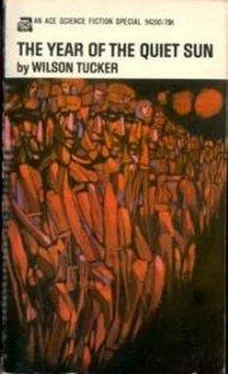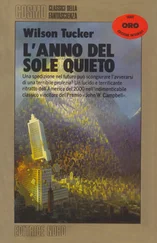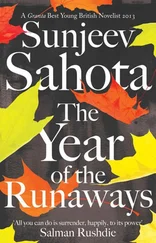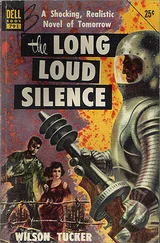Wilson Tucker - The Year of the Quiet Sun
Здесь есть возможность читать онлайн «Wilson Tucker - The Year of the Quiet Sun» весь текст электронной книги совершенно бесплатно (целиком полную версию без сокращений). В некоторых случаях можно слушать аудио, скачать через торрент в формате fb2 и присутствует краткое содержание. Год выпуска: 1970, ISBN: 1970, Издательство: Ace Books, Жанр: Фантастика и фэнтези, на английском языке. Описание произведения, (предисловие) а так же отзывы посетителей доступны на портале библиотеки ЛибКат.
- Название:The Year of the Quiet Sun
- Автор:
- Издательство:Ace Books
- Жанр:
- Год:1970
- ISBN:0-441-94201-6
- Рейтинг книги:3 / 5. Голосов: 1
-
Избранное:Добавить в избранное
- Отзывы:
-
Ваша оценка:
- 60
- 1
- 2
- 3
- 4
- 5
The Year of the Quiet Sun: краткое содержание, описание и аннотация
Предлагаем к чтению аннотацию, описание, краткое содержание или предисловие (зависит от того, что написал сам автор книги «The Year of the Quiet Sun»). Если вы не нашли необходимую информацию о книге — напишите в комментариях, мы постараемся отыскать её.
Won retrospective John W. Campbell Memorial Award in 1976.
Nominated for Nebula Award for Best Novel in 1970.
Nominated for Hugo Award for Best Novel in 1971.
The Year of the Quiet Sun — читать онлайн бесплатно полную книгу (весь текст) целиком
Ниже представлен текст книги, разбитый по страницам. Система сохранения места последней прочитанной страницы, позволяет с удобством читать онлайн бесплатно книгу «The Year of the Quiet Sun», без необходимости каждый раз заново искать на чём Вы остановились. Поставьте закладку, и сможете в любой момент перейти на страницу, на которой закончили чтение.
Интервал:
Закладка:
Neither Gilbert Seabrooke nor Katrina had ever dropped a hint of future plans for the team; he had assumed they would be disbanded when the Chicago probe was concluded and he hadn’t considered staying on. He couldn’t imagine himself wanting to stay on. Well — with one reservation, of course. He would entertain the idea of a probe into the opposite direction: it would be sheer delight to poke and peer and pry into old Palestine before the arrival of the Roman Tenth Legion — well before their arrival.
He found himself on E Street.
The recreation area appeared not to have changed at all. The post theater wasn’t yet opened, its parking lot was empty. The officers’ club was already brightly lit and filled with music, but the second club nearby for enlisted men was dark and silent. The pool area was closed for the winter and its gate secured by a lock. Chaney peered through the fencing but saw nothing more than a deserted patio and a canvas covering stretched over the pool. The chairs and benches together with the tables and umbrellas had been stored away, leaving nothing but memories clashing with a cold November evening.
He turned away from the fence to begin an aimless wandering about the station. It seemed normal in every respect. Automobiles passed him, most of them going to the commissary; he was the only man on foot. The sound of an aircraft brought his head up, his eyes searching the sky. The plane was not visible — he supposed it was above the thickening cloud cover — but he could follow its passage by the sound; the craft was flying an air corridor between Chicago and St. Louis, a corridor which paralleled the railroad tracks below. In a few minutes it was gone. A drop of moisture struck his upturned face, and then another, the first few flakes of promised snow. The smell of snow had been in the air since morning.
Chaney turned about to retrace his steps.
Three automobiles waited side by side in the parking lot behind the lab. His companions were back, neither of them languishing in a Joliet jail — but he suspected it would be terribly easy to get into jail. Chaney lifted the hood of the nearest car and laid his hand on the motor block. He almost burned the skin from his palm. The hood was snapped shut, and he gathered up the gear from the seat of his own car.
The twin keys were fitted into the locks of the operations door and turned. A bell rang somewhere below as the door eased open.
“Saltus! Hello, down there — Saltus!”
The hurtful sound hit him with near physical impact. The sound was something like a massive rubber band snapped against his eardrums, something like a hammer smashing into a block of compressed air. It struck and rebounded with a tremulous sigh. The vehicle kicked back following its time path to home base. The sound hurt.
Chaney jumped through the door and pulled it shut behind him.
“Saltus?”
A sandy-haired muscular figure stepped through the open doorway of the fallout shelter below.
“Where the hell have you been, civilian?”
Chaney went down the steps two or three at a time. Arthur Saltus waited at the bottom with a handful of film.
“Out there — out there,” Chaney retorted. “Knocking around this forsaken place, staring through the fences, sniffing at the cracks and peeping in windows. I couldn’t find a spoor. I think we’re gone from here, Commander — dismissed and departed, the barracks padlocked. I hope we get a decent bonus.”
“Civilian, have you been drinking?”
“No — but I could use one. What’s in the stores?”
“You’ve been drinking,” Saltus said flatly. “So what happened to you? We looked all over town.”
“You didn’t look in the library.”
“Oh, hell! You would, and we didn’t. Research stuff. What did you think of 1980, mister?”
“I don’t like it, and I’ll be liking it even less when I’m living in it. That milquetoast was re-elected and the country is going to hell in a handbasket. A fortyeight state sweep! Did you see the election results?”
“I saw them, and by this time William has passed the news to Seabrooke and Seabrooke is calling the President. He’ll celebrate tonight. But I’m not going to vote for him, mister — I know I didn’t vote for him. And if I’m living Stateside then — now — I’m going to choose one of those three states that voted for the other fellow, old What’s-his-name, the actor fellow.”
“Alaska, Hawaii, and Utah.”
“What’s Utah like?”
“Dry, lonely, and glowing with radioactivity.”
“Make it Hawaii. Will you go back to Florida?”
Chaney shook his head. “I’ll feel safer in Alaska.”
Quickly: “You didn’t get into trouble?”
“No, not at all; I walked softly and carried a sweet smile on my face. I was polite to a mousy librarian. I didn’t sass the cops or buy any pork in a grocery store.” He laughed at a memory. “But someone will have to explain a parking ticket when they trace the license number back to this station.”
Saltus looked his question.
Chaney said: “I got a ticket for overtime parking. It was an envelope affair; I was supposed to put two dollars in the envelope and drop it in a collection box. I didn’t. Commander, I struck a blow for liberty. I wrote a note.”
Saltus eyed him. “What was in the note?”
“We shall overcome.”
Saltus tried to stifle startled laughter, but failed. After a space he said: “Seabrooke will fire you, mister!”
“He won’t have the chance. I expect to be far away when 1980 comes. Did you read the papers?”
“Papers! We bought all the papers! William grabbed up every new one he could find — and then read his horoscope first. He was down in the mouth; he said the signs were bad — negative.” Saltus turned and waved toward newspapers spread out on the workbench. “I was photographing those when you came in. I’d rather copy them than read them onto a tape; I can blow the negs up to life size when we get back — larger than life, if they want them that way.”
Chaney crossed to the bench and bent over to scan a page under the camera lens. “I didn’t read anything but the election results, and an editorial.”
After a moment he said excitedly: “Did you read this? China invaded Formosa — captured it!”
Get the rest, read the rest of it, Saltus urged him. “That happened weeks ago, and now there’s hell to pay in Washington. Canada has formally recognized the take-over and is sponsoring a move to kick Formosa out of the United Nations — give the seat to China. There’s talk of breaking off diplomatic relations and stationing troops along the Canadian border. Civilian, that will be a real mess! I don’t give a damn for diplomats and diplomatic relations, but we need another hostile like we need an earthquake.”
Chaney tried to read between the lines. “China does need Canadian wheat, and Ottawa does like Chinese gold. That’s been a thorn in Washington’s side for thirty years. Are you a stamp collector?”
“Me? No.”
“Not too many years ago, American citizens were forbidden to buy Chinese stamps from Canadian dealers; it was a crime to purchase or possess. Washington was being silly.” He fell silent and finished reading the news story. “If these facts are reliable, Ottawa has made a whopping deal; they will deliver enough wheat to feed two or three Chinese provinces. The cash price wasn’t made public, and that’s significant — China bought more than wheat. Diplomatic recognition and Canadian support for a seat in the United Nations were probably included in the sale contract. That’s smart trading, Commander.”
“They’re damned good shots, too. I told you that. I hate their guts but I don’t downgrade them.” He flipped a newspaper page and repositioned his camera. “What time did you get in this morning? How come you were early?”
Читать дальшеИнтервал:
Закладка:
Похожие книги на «The Year of the Quiet Sun»
Представляем Вашему вниманию похожие книги на «The Year of the Quiet Sun» списком для выбора. Мы отобрали схожую по названию и смыслу литературу в надежде предоставить читателям больше вариантов отыскать новые, интересные, ещё непрочитанные произведения.
Обсуждение, отзывы о книге «The Year of the Quiet Sun» и просто собственные мнения читателей. Оставьте ваши комментарии, напишите, что Вы думаете о произведении, его смысле или главных героях. Укажите что конкретно понравилось, а что нет, и почему Вы так считаете.












